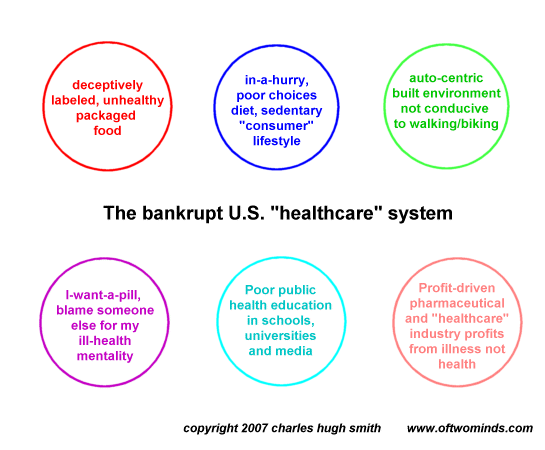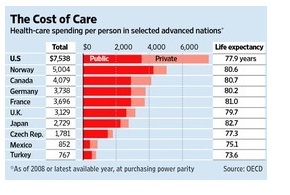Do We Want Solutions, Or Just What's Easy?
January 22, 2015
We are so brainwashed by centralized models of state authority that few can even imagine a system where the solution is not one centralized monstrosity ruled by a political/financial Aristocracy but a competing profusion of opt-in, transparent solutions.
Many readers ask me for solutions to the current arrangement's many ills. Seeking solutions is a healthy and positive direction, for highlighting what's broken is not only much easier than proposing solutions, it's a dead-end. Pointing out what's broken is only the first step in crafting solutions.
But I've noticed that what most people want is not a real solution--they simply want what's easy, which means leaving the Status Quo in place but magically making it cheaper and more convenient for them. If the solution requires inconvenience, getting less, accepting more responsibility and making major trade-offs--then it can't be a solution because politicos have overpromised for so many decades that people expect everything to get cheaper (for them, not the system) and easier (for them, not the system).
For example, I proposed a simple solution to the unsustainably costly U.S. healthcare system: The "Impossible" Healthcare Solution: Go Back to Cash (July 29, 2009).
This solution would definitely lower costs and impose discipline on patients and providers alike--and for that reason, it is seen as "impossible," because the last thing patients and cartels/state agencies want is discipline that forces hard choices and rigorous changes in behavior, diet, fitness habits, etc.
Broadly speaking, the first step in any healthcare solution is to radically reduce preventable diseases that result from lifestyle choices by making patients responsible for the consequences and costs of their lifestyle choices.
The next step is to make the real costs of treatment and coverage transparent, so people--patients and citizens-- can see the real costs and make decisions based on the limits of cost, effectiveness, etc.
Both of these steps are absolute anathema in the current system.
I have addressed the systemic ills of U.S. healthcare (a.k.a. sickcare because it profits from sickness rather than from health), for many years, most recently in ObamaCare: The Neutron Bomb That Will Decimate Employment (February 22, 2013). Over the years, I have presented a number of options to the present unsustainable, fraud-ridden, costs-twice-as-much-per-person-as-other-nations system that ObamaCare leaves intact:
Healthcare: A Large-Scale Solution (January 4, 2011)
A Sustainable National Healthcare System: Prevention Only (August 20, 2012)
How to Cut America's Healthcare Spending by 50% (August 21, 2012)
Nobody likes any of the practical solutions because everyone wants unlimited care
and unlimited choice. Expectations in a system where the government can just borrow
another $1+ trillion to pay the bills are unrealistically high, and the feedback from reality, i.e.
price, has been eliminated in the current cartel/state-fiefdom system.
Everyone talks about "reform," but real reform is impossible in a bought-and-paid-for
"democracy" like ours:
Why Reform Won't Work (February 7, 2013).
Even more profoundly, the Central State and ObamaCare are the wrong unit size
to provide healthcare that is transparently priced, accountable to the consumer,
adaptable and decentralized.
What If ObamaCare, Too Big To Fail Banks and the State Are All the Wrong Sized Unit?
(February 25, 2013)
Rather than a single top-down system, we need dozens of transparent opt-in choices.
Centralized, top-down systems are quickly stripped of innovation and cost control as
the political and financial Aristocracy soon capture the regulatory and governance
machinery for their own benefit.
As I noted in
The Pareto Economy (February 18, 2013), 80% of the benefits could be reaped for
20% of the money squandered on our corrupt, fraudulent, ossified centralized systems.
We suffer not just from a systemic failure of imagination, but from a child-like desire for what's easy and convenient. This is a theme I have explored
many times:
Questioning "Progress" and the Poverty of our Imagination (June 11, 2010)
Oversupply of Old Failed Ideas, Undersupply of New Pragmatic Ideas (July 16, 2010)
Our Dust Bowl Economy (November 20, 2012)
America Is Just Going Through the Motions
What If We're Beyond Mere Policy Tweaks? (February 6, 2012)
Spoiled Teenager Syndrome (January 3, 2013)
A good first step would be to admit to ourselves that we don't really want solutions;
what we want is magic: financial magic that makes healthcare free and affordable,
medical magic that fixes all our lifestyle ills without forcing any rigorous adult routines and limits on us, political magic that transforms our system from its current corrupt crony-capitalist paradise into a functioning, transparent democracy and economic magic that makes all the unpayable debt vanish so we can borrow another $50 trillion, or $100 trillion, with no restraints on our spending or cronyist corruption.
I have no idea what it will take to jolt us from our preference for magic over realistic, difficult (i.e. adult) solutions, but I suspect a crisis that threatens to completely unravel the Status Quo will be part of the process.
Admin. note: I will be off-line for the remainder of the month, other than
a few moments here and there to post new content. Thank you for your readership and understanding.
NOTE: Contributions/subscriptions are acknowledged in the order received. Your name and email
remain confidential and will not be given to any other individual, company or agency.


We are so brainwashed by centralized models of state authority that few can even imagine a system where the solution
is not one centralized monstrosity ruled by a political/financial Aristocracy but
a competing profusion of opt-in, transparent solutions.
When the present path cannot possibly lead to success, regardless of the labor and
treasure poured into the effort, then risking the unknown by trying something different
is the only way forward.
|
Thank you, Robert B. ($10), for your splendidly generous contribution to this site-- I am greatly honored by your steadfast support and readership. |